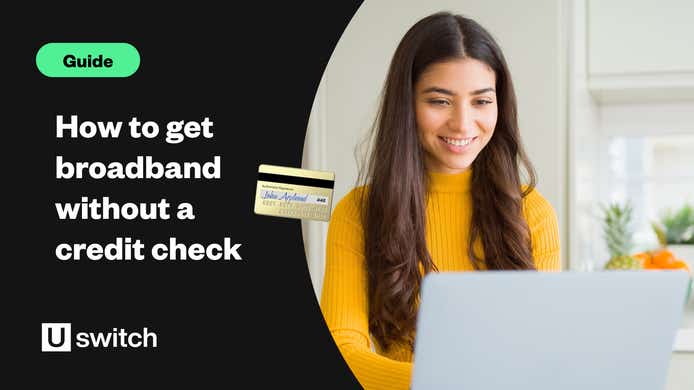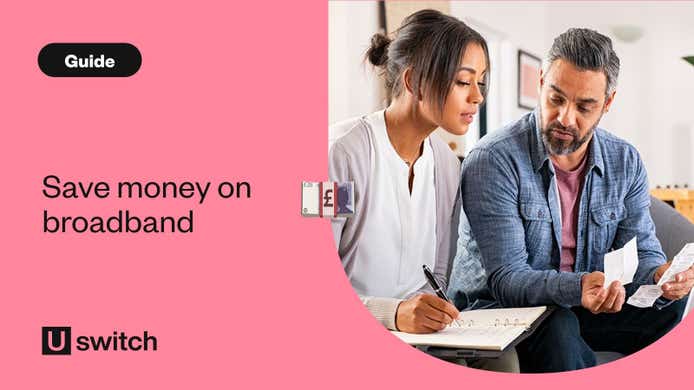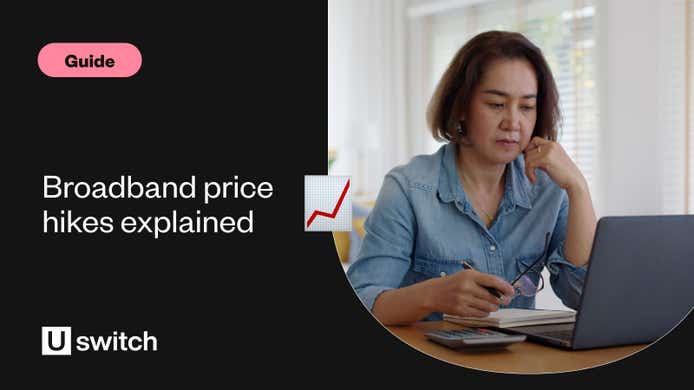Social tariffs are available from several broadband providers, helping those on benefits access an internet connection at a much lower monthly price.
With the cost of living crisis still affecting millions of Brits, many on low incomes may struggle to afford the monthly cost for broadband. But there's good news for a large number of these households - many may qualify for a heavily-discounted broadband deal, called a 'social tariff'.
If you're eligible for a social tariff, now is the perfect time to start paying less for your broadband, often while keeping the internet speed you're currently on.
Read on to learn which providers offer low-cost internet service and how you can check your eligibility for them.
Social tariffs explained: low income broadband deals
Social tariffs are a way to get broadband if you're receiving Universal Credit or another type of financial support. They're much cheaper than the standard monthly rate for the service and are reserved for these customers to help them afford the usual monthly price of a broadband connection.
They’re still usually the same speed and quality as other home broadband deals. The only difference is the monthly cost. Plus, they're not affected by the annual mid-contract price hikes some providers include, either.
Uswitch recently found that two-thirds of financially vulnerable households are unaware that low-income broadband tariffs exist. That's a rough total of ten million homes that could save up to £234 a year, or nearly £20 per month, on a cheaper broadband contract*.
Find fixed-price broadband from providers without mid-contract price rises.
What if I'm not eligible for a broadband social tariff?
If you don't receive government financial support but still want to find a low-cost broadband deal, you can take a look at cheap broadband deals on Uswitch.
Find cheap broadband deals
Browse our selection of low-cost broadband deals if you want to save money on your next broadband service.
List of broadband social tariffs for people on benefits
Some providers offer a much cheaper broadband deal to help low-income customers afford a strong, reliable internet connection.
Browse the following options to see which providers offer discounted broadband deals for families on low incomes.
| Provider | Deal | Speed | Price per month |
|---|---|---|---|
| Community Fibre | Essential 35 Mbps | 35Mbps | £12.50 |
| Virgin Media | Essential | 15Mbps | £12.50 |
| BT Home Essentials | No Income Plan | 36Mbps | £15 |
| Hyperoptic | Fair Fibre 50 | 50Mbps | £15 |
| Wessex Internet | Fibre Social Tariff | 35Mbps | £17.50 |
| Sky | Broadband Basics | 36Mbps | £20 |
| NOW Broadband | Basics | 36Mbps | £20 |
| Virgin Media | Essential Plus | 54Mbps | £20 |
| BT Home Essentials | Fibre Essential Plan | 36Mbps | £20 |
| Vodafone | Fibre 2 Essentials | 73Mbps | £20 |
| Hyperoptic | Fair Fibre 150 | 150Mbps | £20 |
| BT Home Essentials | Fibre 2 Plan | 67Mbps | £23 |
| Connect Fibre | Basic Essentials | 150Mbps | £20 |
Am I eligible for social tariff broadband?
Here are some of the eligibility requirements each of the major UK broadband providers have for their broadband social tariffs.
BT Home Essentials
BT offers a near-half-price fibre broadband deal that millions of low-income customers who receive government financial support can get.
The BT Home Essentials 'No Income' plan offers part-fibre broadband speeds of 36Mbps but for a much cheaper monthly price of £15. The regular deal, BT Fibre Essential, usually costs around £30 per month.
If you’re looking for a low-income phone and internet service, the No Income plan also includes unlimited anytime calls to UK mobiles and most other landline numbers. This option is only available for financial support claimants who do not receive any employment income at all.
If you would like an even faster BT deal, you could upgrade to the BT Home Essentials 'Fibre 2' deal for £23 per month (often over £30).
Am I eligible?
You can qualify for BT Home Essentials if you are on any of the following:
- Universal Credit
- Income Support
- Jobseeker’s Allowance
- Employment and Support Allowance
- Pension Credit
To qualify for the 'No Income' social tariff, you must also not receive income from paid employment alongside your financial support plan.
Sky Basics social tariff
Sky's discounted broadband deal, called Sky Basics, plus its sister company NOW's package, NOW Basics, costs £20 per month for 36Mbps broadband speed. Both plans also come with pay-as-you-go landline calls.
36Mbps is enough to handle most of a family's internet demands, including streaming videos on a couple of screens while other family members scroll social media or listen to music. But at £20 per month, it's slightly more expensive than other social tariffs for similar internet speeds.
Am I eligible?
These social tariffs from Sky and NOW are only available to existing Sky and NOW customers, so you'll need to already be paying for a service from those providers in order to get your bill discounted.
To qualify for the discount, you must also be claiming one of the following:
- Universal Credit
- Pension Credit
- Income Employment Support Allowance
- Income Support
- Jobseeker's Allowance
Virgin Media Essentials
Virgin Media offers two Essential broadband connections for customers on financial support plans. These connections are 30-day rolling and do not change price unless you move off the financial support plans.
For a monthly fee of £12.50, the Essential package supplies speeds of 15Mbps. With this speed, two people could stream HD video at once, and there would still likely be enough bandwidth for social media scrolling at the same time. However, it’s still half the average speed you normally get from fibre broadband.
If you're looking for a faster speed, Virgin also offers a 54Mbps Essential Plus package for £20 per month. The same conditions apply: a 30-day rolling contract and no mid-contract price rises. 54Mbps is a much more suitable speed for larger families where multiple people will be streaming, working or gaming at the same time.
Am I eligible?
To access Virgin Media Essential broadband, you must provide evidence that you are eligible for the same government financial support schemes as detailed earlier:
- Universal Credit
- Income Support
- Jobseeker's Allowance
- Pension Credit
- Income-Based Employment Support Allowance
After your application is submitted, you will receive more information on how to do this.
Learn more about Virgin Media Essential broadband on its own site.
Vodafone Essentials
One of the most recent providers to announce a social tariff is Vodafone.
With Vodafone Essentials 2, you get access to 73Mbps average internet speeds for £20 per month.
Plus, it comes in a shorter 12-month contracts, with no mid-contract price rises or early exit fees. So you get a lot of flexibility when deciding how long you need the connection.
The low-income deal is available to all existing and new customers, provided you are eligible for the service.
Am I eligible?
Vodafone says you need to be in receipt of "specific government benefits" to qualify for its Vodafone Essentials broadband social tariffs.
It includes more financial support schemes than other providers in its reliability criteria:
- Universal Credit
- Disability Allowance
- Jobseeker’s Allowance
- Personal Independence Payment
- Pension Credit
- Reduced Earnings Allowance
- Income Support
- Employment Support Allowance
To sign up for the deal, you first need to check you are eligible by completing a registration form. Vodafone will then run an eligibility check, and then call you if it succeeds to process your order. This should take about one week to happen.
Hyperoptic Fair Fibre
Hyperoptic offers two discounted broadband deals at differing speeds for low-income households. Eligible customers can either choose the entry-level Fair Fibre 50 Plan for just £15 per month or the Fair Fibre 150 tariff for a monthly price of £20.
Fair Fibre comes with a 50Mbps broadband speed, which is plenty of bandwidth for a small household.
The contract is available on a monthly rolling basis, meaning you can cancel within 30 days if your financial situation changes. Installation is also free, and you can add a £3 per month landline service with free evening and weekend calls.
Its Fair Fibre 150 option is the faster Fair Fibre option from Hyperoptic. You get all the same benefits as its Fair Fibre 50 plan, but instead, a much faster broadband speed of 150Mbps.
If you have a household of five or more internet users or have people living with you who use the internet for heavy downloads and high-quality streaming, this speed might be better for you. Fair Fibre 150 costs £20 monthly.
Am I eligible?
The Hyperoptic Fair Fibre Plan is available to individuals who use one of the following financial support schemes:
- Universal Credit
- Income-based Jobseeker's Allowance
- Income-based Employment and Support Allowance
- Personal Independent Payment (PIP)
- Housing Benefit
- Care Leavers' Support
- Pension Credit
- Income Support
Hyperoptic's broadband coverage is less widespread than the larger nationwide. So you'll have to make sure have access to its full fibre network before you seek one of its Fair Fibre plans.
Community Fibre Essential
Full fibre broadband provider Community Fibre offers a cheap broadband deal at a similar price to a social tariff, but without any eligibility criteria to meet if you want to sign up for it.
The Essential package from Community Fibre offers 35Mbps speeds for just £12.50 per month.
35Mbps is decent for regular households who use the internet for standard things like TV streaming, working from home or online gaming. Larger households may struggle to get all they want done with this speed, but it should be fast enough for the majority of families.
Am I eligible?
Community Fibre won't ask you to prove that you're on any income support in order to get this deal, which essentially means that anyone can sign up.
The only thing you'll need to check is whether you can actually get this broadband package at your home. It's supplied by Community Fibre's full fibre network, which is currently primarily based around London and limited to a limited number of properties there.
If you're already a Community Fibre customer, this shouldn't be much of an issue. But if you're looking to choose this deal as a new customer, you'll have to make sure your property can access it.
Does EE have a broadband social tariff?
EE doesn't provide a social tariff for broadband, but its parent company BT does.
All customers of the BT Group providers (which includes BT, EE and Plusnet) who are eligible for a social tariff will be able to choose from the two BT Home Essentials social tariffs.
Is there free internet for those on benefits?
There is no 'free broadband' service on offer from the UK government. The best solution if you're on Universal Credit or another government financial support scheme is to move onto a discounted social broadband tariff.
However, if you're a jobseeker, TalkTalk is working with Jobcentre Plus to offer a six-month no contract broadband voucher for its Fibre 35 package.
Once that six-month free period ends, you'll can either start a new contract with TalkTalk, or cancel your service without charge.
You can read more about those below and read more about TalkTalk's deal here.
No upfront cost broadband
Browse our range of broadband deals with no upfront cost.
Are there other cheap broadband deals available?
There are many low-cost broadband deals to choose from. They aren’t as cheap as the deals mentioned above, but they come with some of the lowest monthly prices you could find on the broadband market.
Instead of basic or limited plans, most of these offers are full packages with the usual bells and whistles you get with broadband service. Plus, you’ll have more flexibility to choose additional services.
Broadband with no credit check
If you don't qualify for a Universal Credit broadband deal but you're concerned your credit score might stop you from getting a broadband deal, take a look at our guide on how to get broadband with no credit check.
Broadband providers in the UK have also recently started waiving early exit fees for any customer who wants to move onto a cheaper tariff. So if you're looking to cut down on your current broadband bill, you won't be charged for doing so.
Not ready to switch yet?
If you're still part-way through your current broadband contract, provide us with your contract end date and we'll send you a handy reminder when you're ready to find a new broadband deal.
Broadband renewal reminder
Tell us your contract end date and we'll remind you to save
Contract end date
Get reminders to find a better deal when your contract is ending. We may use your address and current provider to show you relevant deals. Terms and conditions apply. Privacy notice.
*Respondents in our study were asked, ‘How much do you - or whoever pays your bills - currently spend on your household’s broadband/landline bill(s) every month?’ The average figure for people eligible for social tariffs was £34.50 (compared to £39 not eligible). Swapping to BT’s £15-a-month Home Essentials tariff is a £19.50 a month saving. £19.50 x 12 months x 10.3 million people = £2.4 billion potential saving on broadband.




